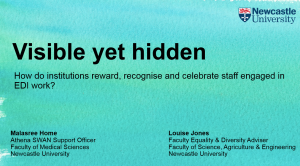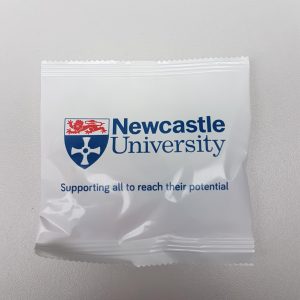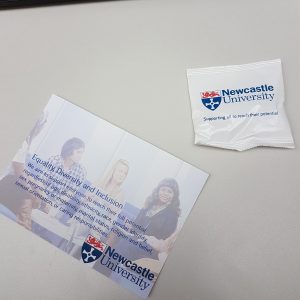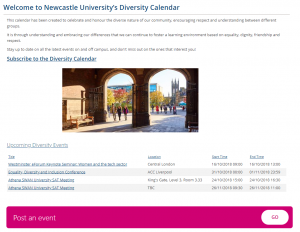
Malasree Home (Athena SWAN Officer, FMS EDI Team):
We all want to be recognised and rewarded for the work that we do, irrespective of the role that we are in.
I’ve been the Faculty’s Athena SWAN Officer for 18 months, and in that time, I’ve become interested in how staff who lead and manage EDI initiatives and projects are recognised, and the impact that this may ultimately have on the success of EDI projects (for example Charter Mark applications), the continuation of EDI teams, and the actual embedding of real cultural change within an organisation.
Scholarly research suggests that recognising, rewarding, and valuing staff can enhance productivity, yet rewarding EDI contributions are perhaps even more challenging than most in a Higher Education context. While, on the one hand, EDI roles demand certain niche skills and training, on the other hand, they often sit outside a specific job description, or are not aligned to promotion criteria. Nevertheless, they are crucial to delivering changes to culture, policies and practices that support any university’s ambition to provide inclusive environments for the benefits of staff and students.
Along with my colleague, Louise Jones (the E&D Advisor in the Faculty of Science, Agriculture and Engineering), I ran a workshop at this year’s Advance HE’s annual EDI Conference in Liverpool around reward and recognition for those in diversity roles – we called it ‘Visible yet Hidden’, hoping to capture some of problems that diversity professionals face. Organisations focus on the equality, diversity and inclusion (EDI) agenda and promote its importance, but anecdotal evidence suggests that they are less upfront and eager to recognise and value staff who are involved in supporting this agenda through their day-to-day roles and responsibilities, or by being involved in charter mark applications.
Before the conference, we tested the waters by running a snap survey using the mailing list for all those involved in Athena SWAN nationally, and ran the same survey for EDI leads at Newcastle University as well. The survey clearly struck a chord, and we were not prepared for the volume of responses – we received a total of 121 responses, most of whom were female (82%) and in professional support or administrative roles (60%). The results raised some interesting issues, which we presented at the workshop to a very engaged audience.
It was clear that organisations are broadening the remit of diversity roles – very few of the respondents had a specific ‘Athena SWAN’ tag attached to their role descriptors – however, the majority (74%) still retained standard organisational titles (HR Advisor/Project Manager/Lecturer/Senior Lecturer). This raises a lot of questions. To what extent is EDI perceived as an ‘add-on’ to existing roles? If they are not part of the original Job Description, are organisations ensuring that their staff have enough protected time to fulfil these roles? Organisations, especially universities, therefore do need to pay heed to resourcing for broadening the agenda.
The survey also revealed that the majority of EDI roles were junior or middle stage career positions (78%) with possibly very limited power to make changes through organisational decision making processes. Only 22% described themselves as having senior positions within the organisation. If these roles are meant to be the drivers for change, is this small percentage really enough to bring about real cultural change?
Recognition for these roles is linked to their career progression, and the respondents identified some major challenges here. While a large proportion of respondents (74%) felt that they had amassed a huge number of transferrable skills in their role, the majority felt that those were not recognised by current and potential employers, and 46% were unable to identify their next career move from their current role.
This was not helped by the fact that the majority of respondents (74%) had received no external or internal awards for doing their job well. Some organisations had awards for staff who contributed to EDI above and beyond their roles, but staff working in diversity roles did not appear eligible for these awards. A member of the audience asked a wonderful (and telling) question which made the penny drop for many in the room – “would you refrain from nominating someone for a ‘teaching’ or ‘best supervisor’ award just because they were in a teaching or supervisory role?”
Many respondents saw that EDI was important to their employer – a massive 70% said that it was important to their organisation. Yet only 40% of respondents felt that THEY were valued in their roles, with 28% stating that they did not feel valued at all. I think the audience agreed that we now had some numbers to quantify what we had known anecdotally so far!
However, this workshop was not all about doom and gloom, but about a way forward. And in true testament to the skills that all diversity professionals pick up, Louise gave a wonderful overview about what organisations and individuals could do to address this scenario, energising the audience again!
We hope that ultimately, strategic organisations in Higher Education, like Advance HE, will pick up the baton and become a platform where professionals working in diversity roles can connect with mentors in other organisations to improve career progression opportunities, ensuring that this research has long-lasting and meaningful impact.
This workshop was part of a larger project funded through the Equality, Diversity and Inclusion Funds (EDIF), an internal funding scheme available to all staff and students to promote engagement with the Equality, Diversity and Inclusion agenda at Newcastle University. You can read about other EDIF projects here.
We will be running a number of focus groups for staff at Newcastle University (Academic and Professional) in the New Year to further explore the issues identified through the preliminary survey. If you are a member of staff at Newcastle University, and would like to participate in these groups, please contact me directly at malasree.home@newcastle.ac.uk.

 The project had been awarded £2,500 from the EDIF, which was distributed between 6 students in the form of bursaries.
The project had been awarded £2,500 from the EDIF, which was distributed between 6 students in the form of bursaries. In this instalment of our blog series on projects within the University that have been supported by the
In this instalment of our blog series on projects within the University that have been supported by the 

